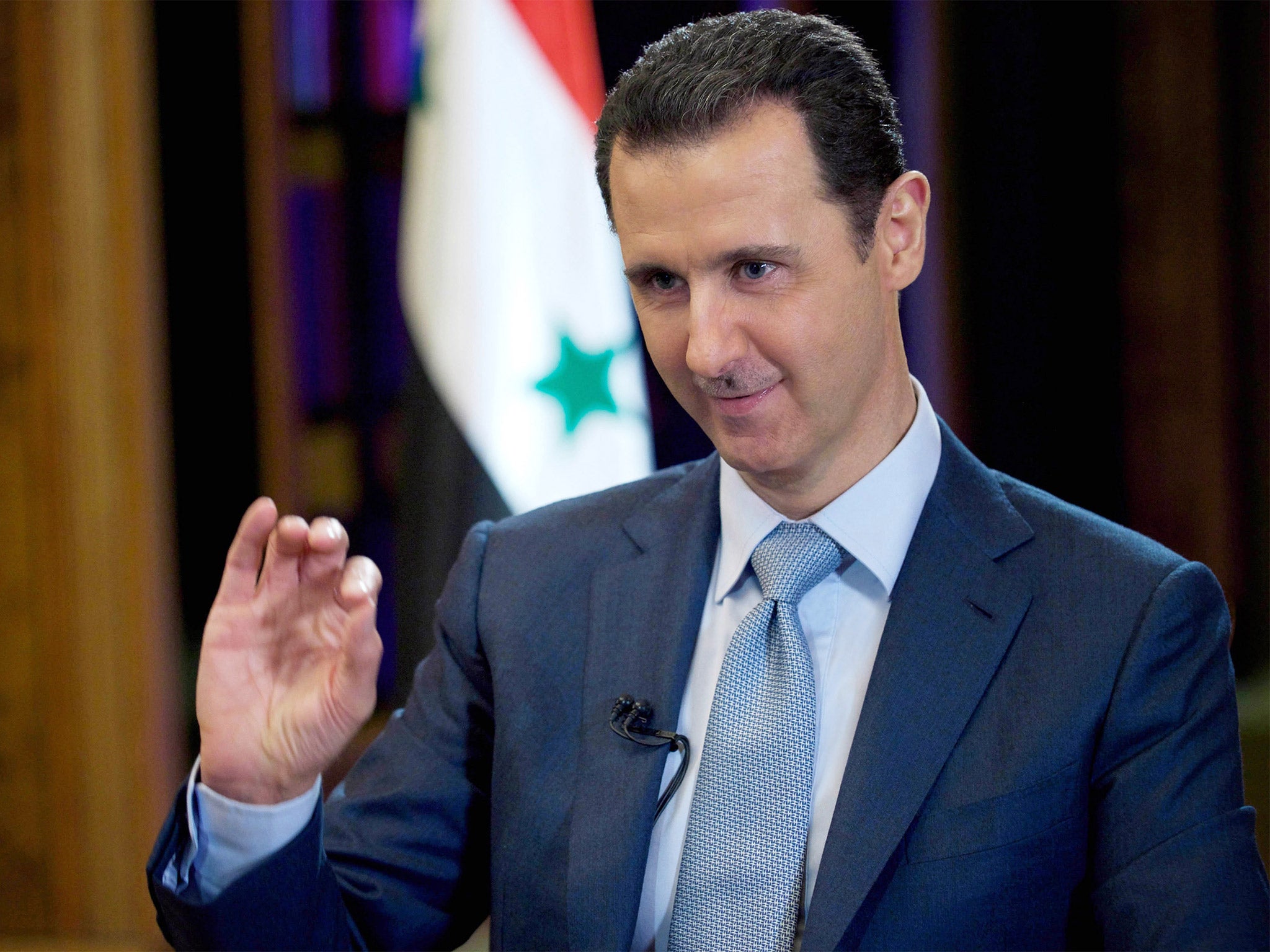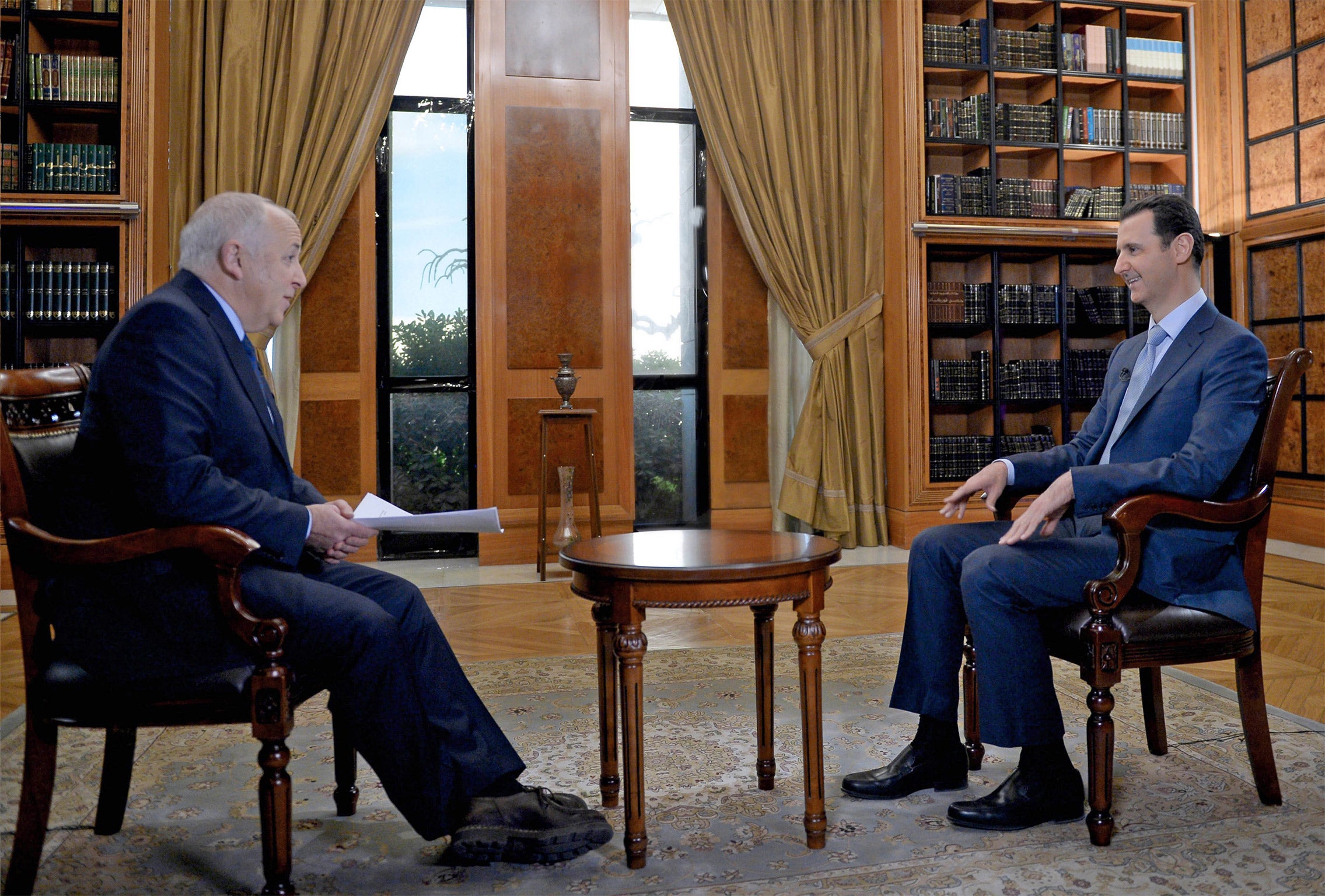War with Isis: Syria's President Assad is overplaying a weak hand – he needs the West to keep militants from Damascus
Mr Assad may be exaggerating the extent to which the tide has turned in his favour. It is by no means clear that the US is going to abandon its previous policy of ousting him


Your support helps us to tell the story
From reproductive rights to climate change to Big Tech, The Independent is on the ground when the story is developing. Whether it's investigating the financials of Elon Musk's pro-Trump PAC or producing our latest documentary, 'The A Word', which shines a light on the American women fighting for reproductive rights, we know how important it is to parse out the facts from the messaging.
At such a critical moment in US history, we need reporters on the ground. Your donation allows us to keep sending journalists to speak to both sides of the story.
The Independent is trusted by Americans across the entire political spectrum. And unlike many other quality news outlets, we choose not to lock Americans out of our reporting and analysis with paywalls. We believe quality journalism should be available to everyone, paid for by those who can afford it.
Your support makes all the difference.President Bashar al-Assad has given four interviews to the foreign media in recent weeks after a year of silence, the latest being to the BBC. The aim is obvious enough: he believes that the moment may have come when the US will be willing to more or less openly accept him as the ruler of the whole of Syria.
This is a logical step for Washington to take if it gives total priority to defeating Isis since the Syrian government and army are the main opponent of Isis on the ground in Syria. The “moderate” Syrian rebels are a feeble and declining force and do not have the strength to combat the jihadis of Isis or Jabhat al-Nusra, the al-Qaeda affiliate.
Mr Assad confirmed in his latest interview that there is tactical coordination between Syria and the US over US air strikes against Isis in Syria with Iraq being the interlocutor. There is nothing surprising in this since it has been evident ever since US air strikes against Isis began on 23 September that they would not be taking place unless it was known that the Syrian government’s air defence system would not be directed against them. Mr Assad denies there is any direct cooperation with the US and says that several third parties are involved.
Syrian government self-confidence is based on a simple calculation that the most powerful leader of the armed opposition in Syria these days is Abu Bakr al-Baghdadi, the self-declared Caliph of Isis. Those rebels who do not follow his black banner mostly follow that of Jabhat al-Nusra, which was created by Mr al-Baghdadi and then split from him. This is politically good news for Mr Assad, but militarily dangerous because it means fragmented opposition groups – 1,200 in number according to the US – are uniting against him under experienced commanders.
Mr Assad may be exaggerating the extent to which the tide has turned in his favour. It is by no means clear that the US is going to abandon publicly its previous policy of ousting him. The political base of the regime looks too small to hope to recapture the whole of the country even if the Americans were prepared to go along with this. The US would also have to persuade Turkey, Saudi Arabia, Qatar and UAE, who fostered the jihadi movement in Syria, to cut their losses and admit that Mr Assad has emerged victorious from the four-year war.

Much will depend here on what happens in Iraq. If a reconstituted Iraqi army and the Iraqi Kurdish peshmerga inflict real defeats on Isis and even recapture Mosul, then the self-declared “Caliphate” may be seen as a strange accident of history. But if they fail and the caliphate looks like becoming permanent then the US turnaround in Syria might be greater.
In terms of public relations, Mr Assad’s performance in the latest interview will do him nothing but good. His excellent English and moderate tone carries credibility, particularly when set against systematic demonisation since the Syrian revolt started in 2011. In some instances, his case is weak but he may benefit from a feeling in the outside world that his claim that opposition to his rule is dominated by “terrorists” has come true – even if he contributed to this outcome.
He says, for instance, that the mass demonstrations against his government were not as peaceful as they looked in 2011. There is some truth in this, but there is no doubt there was a popular uprising against a narrow dictatorship. There was a social upheaval against the corrupt crony capitalism of Mr Assad’s inner circle. Rebel strongholds are in impoverished villages and shantytowns and in areas like north-east Syria where millions suffered from the great drought between 2006 and 2010. Areas where support for the ruling Ba’ath party had been strongest in the 1970s and 1980s, when it guaranteed a minimum living standard, felt abandoned.
Mr Assad has done little to conciliate part of the opposition which is not jihadi and this is probably a mistake. Whatever happens to Isis and the jihadis, the original rebellion of four years ago had genuine mass support and is not going to disappear. The Syrian government has offered talks with the opposition but wants to cherry-pick whom it talks to and in what circumstances. It would like a ceasefire in Aleppo – divided since 2012 between government and rebels – but along the lines of that in Homs last year, which amounted to a surrender by the rebels.
Mr Assad was good at playing a weak hand when his back was to the wall over the last four years. Now that fear of Isis is becoming the determining factor in US and Western policy – though not that of Syria’s neighbours – he may be overplaying his hand.
Patrick Cockburn is the author of 'The Rise of Islamic State: Isis and the New Sunni Revolution' (Verso)